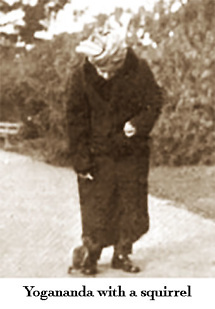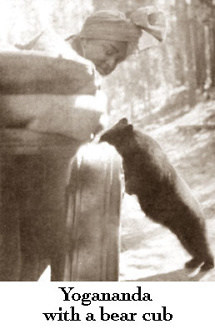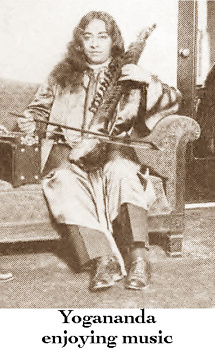Happy New Year!
Do you find this wish pleasing, if somewhat shallow? Indeed, it’s a common seasonal wish, but one that is often empty of content, a social custom, habitually repeated millions of times over the festive season. Together as Daily Meditators, however, let’s charge these words “Happy New Year” with power and meaning, with intention and truth.
2018 has the potential to be a surprisingly happy year, perhaps our best year ever. Why? Because, as Yogananda teaches, “circumstances are neutral.” It is we who color our life from within, constantly and at every moment. And this is where our great opportunity lies. It is as if life had given us a musical instrument so that we can play our own melody. The notes we play, however, can be somber and out of tune with our real nature, or they can be filled with beauty, harmony and golden joy. In 2018, let us consciously play the golden notes of happiness.
The Supreme Golden Note: Santosha
From ancient times, the ten yamas and niyamas (the do’s and don’ts) of Patanjali, the “father of yoga,” have constituted the core attitudes for meditators. One of them – the golden one – is santosha, or contentment, known as the supreme virtue. Yogananda expresses it like this: “Be even-minded and cheerful at all times,” and “Work on yourself: on your reactions to outer circumstances. This is the essence of yoga: to neutralize the waves of reaction in the heart (yogas chitta vritti nirodha). Be ever happy inside.”
This is precisely our golden note!
To set the mood of santosha for our coming year, think of a moment when inwardly you were completely at peace, fully content with life. You didn’t need anything, didn’t feel the urge to go anywhere, or to do anything different from what you were doing. All agitated emotions were at rest as you fully enjoyed the moment. Concentrate on that precious mood for some time. Feel it deeply. Crystallize it within yourself.
Use this feeling as your guiding light for 2018: it is your precious santosha-gold. There are two ways to consolidate it: the one outward, the other inward.
Outwardly, our task is to maintain that feeling of contentment constantly, affirming it, strengthening it day by day, no matter what may happen in our life.
Inwardly, the trick is to not wait for inner joy to appear in our meditations, but to fill them actively with contentment. Swami Kriyananda in fact describes santosha as one of the secrets of meditation:
The secret of meditation is…
affirming contentment,
rather than expecting God to do all the work
of bringing you out of darkness
into His infinite light and joy.
By training ourselves in santosha (conscious contentment), our inner treasure will gradually increase, turning us into a spiritual Croesus: a smile millionaire. Santosha, the Masters say, grows in time into a state of supreme joy. As Patanjali put it centuries ago in his Yoga Sutras (2.42): “Contentment leads to superlative happiness.”
Isn’t that an inviting prospect for our New Year?
Music
In order to infuse our consciousness directly with these ancient yogic teachings, Swami Kriyananda set them to music. A number of his songs brilliantly express santosha, both by their lyrics and their melody. They are great fun too.
One time a woman confronted him: “Well, you can write happy songs. You’ve never suffered!” His reply was, “It is because I’ve suffered, and learned the lesson of pain, that I’ve earned the right to sing happy songs! For true happiness isn’t something one feels only when things are going well. The test of it is its power to transcend suffering.”
May his experience become ours. Suffering hits us all, sometimes mercilessly so, but by daily developing santosha, we can, through its golden power, transcend all the darkness of pain. Where there is light, darkness cannot exist.
You Are Invited!
A powerful way to “make the darkness run” is to listen to joyous music. And there is great news: Swami Kriyananda is inviting us all for a special New Year’s Contentment-Concert, with his own compositions. So let’s gather round: a great treat is waiting for us.
His music, Swamiji tells us, is “philosophy in song,” and so he is setting us a particular task: to extract an important santosha-teaching from each of the songs in the concert – one for our outer life and one for our meditation. Can we do that? Let’s take up challenge.
Are you ready? Well then, take your seat (mentally). Let the New Years Contentment–Concert begin. Just relax into a receptive mood of listening, absorbing and enjoying.
The first piece is one of Swami Kriyananda’s classics:
1. The Secret of Laughter
Listen to this MP3 song by Swami Kriyananda called “The Secret of Laughter”:
To extract the santosha-teaching from it, we should focus on these lyrics: “It’s a swallow winging on the wings, the innocence in a boy.” Swami Kriyananda here teaches the concept of finding joy in little things.
Applying it in Our Outer Life: Contentment Through Little Things
In the coming year, let’s accumulate the gold of contentment through little things. It may mean enjoying the sight of a passing bird, a laughing child, or a pretty flower on the wayside. This approach is much wiser than waiting for major happy moments, which occur all too rarely in life. Swami Kriyananda explains: “Happiness is not a brilliant climax to years of grim struggle and anxiety. It is a long succession of little decisions simply to be happy in the moment.”
Applying it inwardly in meditation for contentment: concentrate on little experiences
Also during our meditations this coming year, instead of waiting for some grandiose experience (a special vision, an unusual phenomena), let’s attune our inner antenna to any small and subtle feeling of peace, of joy, or of depth that we might experience. Let’s concentrate on these, magnifying them. In this way, our inner riches, the gold of our contentment, will increase through the magnifying power of our mind.
How advanced are you as a meditator?
Do you want to be an advanced yogi? Probably. However, we all too easily associate progress with visions, lights, sounds, experiences, or powers. Even Yogananda had that false notion, which Sri Yukteswar had to erase from his mind: “I see that you are imagining that the possession of miraculous powers is knowledge of God. One might have the whole universe and find the Lord elusive still! Spiritual advancement is not measured by one’s outward powers, but only by the depth of his bliss in meditation.”
It is this golden joy that guides our daily life. Yogananda answered: “I do realize now that I have found God, for whenever the joy of meditation has returned subconsciously during my active hours, I have been subtly directed to adopt the right course in everything, even details.”
So how advanced are you? To find out, take out your inner measuring scales and weigh the gold of joy that exists in your meditations and in your daily life. The weight of that gold gives you the exact answer.
Back to our New Year’s Contentment–Concert! The second song is great fun indeed. “It’s from the deeeep South,” Swami Kriyananda smilingly explains, adding: “I always have to sing this one.” People have long loved it. He himself plays the guitar. Enjoy.
2. The Non-Blues
Now listen to this MP3 song by Swami Kriyananda called “The Non-Blues”:
To extract the santosha-teaching from it, let’s focus on these lyrics: “For I find that this whole world around me, like a mirror upon the wall, smiles back when I smile, looks blue when I’m blue, and that blue shade I don’t like at all!” Swami Kriyananda is here conveying the “mirror concept.”
Applying it in our outer life: smile at life always
Life, this teaching says, mirrors back to us what we ourselves send out. Doesn’t life give us every reason to be sad and upset, but also every reason to be happy and cheerful? Ours is the choice, each day, each moment, right here, right now. And whatever we chose will determine how life appears to us, as if we were standing in front of a mirror. “Wind on a hill sounds lonely if you’re sad; free, if you’re free; cheerful, if you’re glad.” In short: in the coming year, 2018, let us all determinedly smile at life, inviting it to smile right back at us. Santosha is, and always will be, the golden lifestyle.
Applying it inwardly in meditation for contentment: affirm contentment
We all have a goldmine inside. In meditation, in our inner cave, if we develop the eyes of a gold-miner who focuses not on the gray rocks, but on any little glimmer of hidden gold, then our meditative cave will gradually shine in our eyes, revealing its riches.
The asanas
Santosha is also the golden attitude for practicing the yoga asanas. Kriyananda explains in his book Raja Yoga: “Practice the yoga postures always with a sense of quiet enjoyment. Feel almost as if you were smiling while you practice them. Learn the rhythm and capacities of your own body, and lead it gently on the pathway to perfection… One can advance far more rapidly in yoga if one bears in mind the teaching of great yogis, that contentment is the supreme virtue.”
A little Ananda Yoga sequence for santosha
If you practice the asanas, you can increase your inner gold of santosha with this little sequence:
First warm up for a few minutes.
1) Start with Garudasana, the Eagle Pose. Affirm and deeply feel: “At the center of life’s storms, I stand serene.”
2) Then enter into Trikonasana, the Triangle Pose, feeling throughout your body: “Energy and joy flood my body cells. Joy descends to me.”
3) Next practice Janushirasana, the Head-to-the-Knee Pose. Permeate your consciousness with santosha: “Left and right and all around—life’s harmonies are mine.”
4) Follow it with Salabhasana, the Locust Pose. Affirm and absorb: “I soar upward on wings of joy!”
5) Enter, if you can, into Sarvangasana, the Shoulderstand. Try to feel a river of peace, joy, and harmony flowing into your head, and affirm: “God’s peace now floods my being!” Alternatively chose any other joyful inverted pose.
6) Then enter Savasana, deep relaxation. Enjoy santosha for a while.
7) Finally, sit in meditation. If your body permits you, sit in Siddhasana, the Perfect Pose, and meditate on these words: “I set ablaze the fire of inner joy.”
By regularly practicing this sequence in 2018 with an attitude of conscious contentment, life will be obliged to mirror back to us the golden beauty of santosha.
No inner experiences?
Especially in his later years, Swami Kriyananda was immersed not only in contentment and joy, but also in divine bliss, in spite of many painful physical ailments. Once, in Italy, in a restaurant, he made a surprising confession: “I believe I have been in Cosmic Consciousness in other lifetimes. But in this one I have no particular meditative experiences: light, this and that.” A close friend was puzzled and answered: “But you hear OM all the time.” “Yes. Well, I can’t say I don’t have experiences. I feel bliss. And that’s the most important thing.” We all agree, don’t we?
Back to our New Year’s Contentment–Concert! Kriyananda infused the following tune with a great sense of happiness and joy. He himself is not singing this time, and it is the choir that performs. The lyrics might be a little difficult to understand, so here they are:
“Mañana, friends, the world will still be there: a world of suffering, a world of care. Today we’ll dance and tell the universe, there’s love and song for everyone. Fling joy, like roses, on the laughing wind, send melodies upon the air! Tell everyone that joy is theirs alone who smile at life and call it fair.”
3. Mañana, Friends
Swami Kriyananda is here teaching the concept of being able to set troubles aside.
Applying it in our outer life: learn to set aside all trouble
This coming year, when our time comes for relaxation and rest, let’s resolutely set aside all our problems, our work, difficulties and challenges. They won’t run away and afterwards we’ll confront them again. But during our free time let’s “dance,” let’s have fun, be in nature, read an enjoyable book, practice lightness, increasing thereby the gold of our unshakable santosha.

Applying it inwardly in meditation for contentment: putting all troubles aside
In meditation too, as we all know, our mind tends to rotate around our problems and our work. Instead let’s be uncompromising, resolutely putting it all aside, in order to exclusively contemplate the Divine. It’s a tough job, but it’s worth it because every effort brings a few more grams of gold into our life.
Beat life!
Yogananda calls us to respond to our troubles with enormous vigor: “Never let life beat you. Beat life. If you have a strong will you can overcome all difficulties.”
Swami Kriyananda himself was an inspiring example of santosha in the midst of life’s troubles and blows. He relates that in the darkest period of his life, when he was expelled from his Master’s organization (SRF), he suffered immensely. Yet amazingly, all the while he perceived an undercurrent of inner joy: it was the golden glimmer of santosha which he had accumulated over many years, though his yogic practices and right attitude. He writes (in The New Path): “Marvelous to relate, throughout this period, which was certainly the bleakest of my life, abandoned as I felt by God and man, I experienced, on some deep level within me, a subtle joy that never left me.”
Indeed, that inner joy never left him. In the early years of Ananda, in 1970, his first temple, which he had just constructed with a great amount of effort and investment, burnt down. Later that very day, he entered a nearby shop, singing. The proprietress exclaimed, “When our house burnt down I wept for six months! And you’re singing!” “Why not?” Kriyananda asked. “I’ve lost a temple, but I haven’t lost my voice.”
Sing often!
Fortunately, he never lost his voice. Instead, he continued to sing always, even when his body suffered. In one memorable occasion in Assisi, Italy, a few of us were at a restaurant with him. To the delight of those present, he suddenly started singing, giving an impromptu concert consisting of the funniest songs.
First he sang a hilarious American tune from the ’50s: “You’re the cream in my coffee, you’re the salt in my stew.” Naturally it gave rise to laughter from all sides. Next, he presented another amusing American song, “Alka Seltzer.” For the following song, he mimicked opera, in a most dramatic way: “O cessate di piagarmi o lasciatemi morir” (“Oh stop wounding me, oh let me die”). You can listen to it, imagining Kriyananda interpreting it.
The next song was his only political song, quite funny and delightful: “Paper, Anyone?” Then he chose a love song, “John Anderson.” For the finale, he performed some of his beautiful Shakespeare songs. There was joy was in the air.
Moral: Whenever life becomes tough in 2018, let us respond with a song in order to “sing the blues away!” In Italy, there is a wise saying: “Sing and it will pass.”
Time to get back to our New Year’s Contentment–Concert. The next song is pure fun, nothing more and nothing less. Kriyananda admits: “The truth is, it’s sheer gibberish… I have written, hmmm, something that purports to be Hawaiian, but it’s not. And I even had the chutzpah to write a translation in English.” When you hear him say, “So where is the…”, imagine some dressed up young dancers appearing on stage, performing a Hawaiian dance. It is golden fun, overflowing with santosha.
4. Hawaiiana
To extract the santosha-teaching, we should focus on the mood of the song: playfulness. It is especially important for those of us who tend to be a bit too serious.
Applying it in our outer life: be playful
Putting this into practice during the coming year, 2018, let’s always make time for having fun and being playful (sometimes even play-fool): feeling free, creative, doing things no one has done, singing songs which no one has sung. “Dare to be different, dare to be free.”
Applying it inwardly in meditation for contentment: have fun
Why not have some fun during our meditations too? A little creativity never hurts in order to keep them fresh (without ever sacrificing correct technique, of course). Do any of you reading this ever have fun with God during your meditations, playing with Him or Her? That would be an inspiring experience to share with all of us.
Playfulness
In 1949, Yogananda appointed Kriyananda as head of the monks. Brother Turiyananda (1926-1990) of the SRF shared with Ananda members his fond memories of that time: “I love Kriyananda. When he was here, there was such joy at Mt. Washington. Laughter rang through the halls.” He inspired the monks, served them, but also had fun with them: one day he dyed shirts for them, in many different and happy colors. It was nothing but pure fun. Indeed, why be always serious in the name of spirituality? “Don’t make too many rules. They destroy the spirit,” Yogananda had advised Kriyananda.
Ananda has maintained Yogananda’s free and youthful spirit. Kriyananda even wrote: “Ananda encourages eccentricity.” Isn’t that amazing? He enjoyed devotees who were original, as long as it came from their origin, not from the ego. And yes, some of them were (or are?) quite eccentric. In short: if you happen to have a somewhat odd personality, don’t worry. Just be merrily yourself in 2018.
Joke
What about joking, in the name of contentment? Yogananda advised (in The New Path): “Don’t joke too much. Joking is a false stimulant. It doesn’t spring from true happiness and doesn’t give happiness. When you joke a lot, the mind becomes light and restless so that it can’t meditate.”
“Not too much,” however, doesn’t mean never. The Master himself at times told a joke. Crystal Clarity recently published a book, The Man Who Refused Heaven, which focuses on his wonderful sense of humor. Kriyananda similarly told funny jokes (clean ones, of course), making his audiences laugh and relax.
Here is a very short one: A wife says to her aged husband, “Darling, your teeth are just like the stars: they come out at night!”
Let’s continue now with an instrumental number for our New Year’s Contentment–Concert: a lively Romanian dance.
5. Gypsy Hoedown
Applying it in our outer life:
The lively melody conveys a special santosha-message for the coming year: “Dance more, in your spirit and with your body too! Dance through life, together with God, through all ups and downs.” This teaching might be especially useful for those of us who tend to be a bit too rational. Life, Kriyananda teaches, is more like skiing, not like a game of chess. Skiing is a flow, a dance.
Applying it to meditation for contentment:
Try to bring the spirit of dance into your meditations also, following Yogananda’s inspiration:
The waves of my song
shall dance on Thine ocean of cosmic-rhythm
and float me on billows of devotion to Thy shores.
Finale
To conclude his New Year’s Contentment–Concert, Swami Kriyananda will read two special poems, both by his great Master, Yogananda. The first one is entitled, Make Me A Smile Millionaire, from Whispers From Eternity.
The second poem, an excerpt from “Smile Forever”, is offered by Swami Kriyananda with love and blessings for your coming year, that you may be rich with the gold of santosha, no matter how tough our world becomes.
Smile Forever
Let smiles be the everlasting vehicle
in which you roam through life and death,
sorrow and pleasure, health and sickness alike.
Smile at death, for it pretends to destroy you,
who are the indestructible image of God.
Smile when trials burst upon you;
smile when the goblin of poverty stalks,
and when all hope threatens to leave you.
Let all things — fame, fortune, even life, leave you,
but hold on to the throne of your smile,
for if you can smile, no matter what happens,
then God will smile through you.
Smile when you are crying;
smile when you are laughing;
smile when you are losing, and smile when you are winning.
Smile when you are growing; smile when you are dying,
and you will die no more, for laughter is the Life of Spirit.
In the spark of a lasting smile
is the attainment of Immortal Happiness.
Let’s now give a big round of applause. Thank you, Swami Kriyananda, for this delightful concert. May it guide and inspire us in the months ahead, transforming 2018 into a truly “Happy New Year.”
Jayadev
Ananda Course in Meditation
A 10-week online course with in-depth instruction in scientific meditation techniques that bring more peace, deeper relaxation, and focused concentration to every area of your life.
Learn more




22 Comments
I can be happy with very little, I can endure troubles with little stress as long as they don’t affect my children, it is always the concern for those who depend on me that causes me pain. I live in Thailand and must renew my visa every year if for some reason this wasn’t renewed I would have to leave with no way of being able to support those I love or be able to take them with me, no amount of happy thoughts or songs would help me, everything is relative. One can only trust life and hope the innocent are spared which, when looking at what is happening in Syria, is not always the case.
Dear David, You are very right: the task is much more difficult when ones children or dear ones, are involved. However, try to take Yogananda’s words seriously: “Never let life beat you. Beat life.” Fortunately in the end, all is only a dream. Nobody really dies, nobody really gets hurt. Meanwhile, within this dream, it is better to smile always, and smile anyway. Think, “God is in charge, also in Syria.”
I am so grateful for recieving this beautiful inspiring emails! Thank you so much!
Delightful! Thank you.
Thank you for this article and for the pictures of Master, most of which I have never seen and the songs which we can enjoy for the rest of our lives, at least for this incarnation.
aum
pat wolff
Thank you, Jayadev! Delight-full, as always! :-)
Wow read this out loud to my wife. Had to stop a few times as I was on the verge of tears. Still smiled though ?
Stimulating..Indeed very inspiring…Thanks for sharing
Thank you, Jayadev. Wonderful guidance to “kickstart” the New Year. I have printed it, added the songs to my downloads and away I dive into Contentment!
Nice…very beautiful…
Dear Jayadev, Thank you, Bless you, I never stop being amazed by the ever overwhelming inspiration – putting it mildly – and immense gratitude for each article, awesome, beautiful, wonderful beyond words, and many thanks for the lovely photos also. Wishing you and all the most Blessed New Year, contentment and joy and would like to wish David Snowdon and his family God’s Blessings in Security for always (and everyone else in same/similar circumstances) Namaste
First of all, I`d like to express my heartfelt gratitude to Tyagi Jayadev, for this precious teachings, Contentment – The Golden Note
In these challanging times, your teachings have given us guidelines for what to do.
With these special practices and meditation, everyday, our mind will change.
To change our minds to change ourselves and improve our qualities, like love, compassion, generosity, discipline, patience and wisdom, not only a litle bit, but endlessly.
In closing, I`d also like to extend my warm and profound thanks, to those who have helped me to see my true nature. My inwardly light.
God bless you!…
That was a wonderful and inspiring message – it was so joyful and uplifting. What a great new year gift to us all – a great big bouquet of spiritual flowers of truth you’ve so carefully gathered and then presented to us with such love. It brings a smile on my face and a huge smile in my heart! Joy to you!
Thanks a lot
Rastislav
thank you, Jayadev,I shall treasure what you have shared with your fellow human beings. It is worth more than any million dollar material gift.I will reread it for the rest of 2018.
From: Shyam Sadasivan
Delightful
Dear Jayadev,
Thank you for this beautiful start of the New Year.
No matter what 2018 holds I feel it will bring many deep blessings to us all, especially if we take this beautiful remembrance of the golden note into our hearts.
Following this creative and joyful concert made me recall a moment of playfulness with the Divine and it also attunes to bringing the spirit of dance into meditation. So I wanted to share it with you and all.
It was during the eight hour meditation together with Online with Ananda that I had this lovely experience. At the moment I was not sure if it was okay to go with it but reading your text and your wish to share I thought i should forget about my ego and share it anyway. So, it was towards the end of the eight hours, when the vibration of Blue Danube Waltz started to dance through my consciousness that I found myself in a big concert hall. The orchestra was playing and all around we were dancing together, the Masters, Swami and all the lovely souls from Ananda I have connected with already as well as those who are still to meet. Everyone was so happy as we spun around in this waltz together.
So there was a little memory of fun and dance with the Divine.
In Divine Love,
Alessandra
How beautiful Alessandra, and very inspiring. Thank you.
Wonderful! Even just listening to the first song, the energy in Swami Kriyanandas’ voice made me feel lighter and joyful!
To the applause, I’d also like to add a healthy round for Jayadev, as well as Master. This wonderfully thorough exploration of santosha has me thinking that if I ever adopted a spiritual name, I’d love that one! Also, “The Non-Blues” shows an amazingly wacky side of Swami that I’d never quite seen. Could someone tell me how to download mp3s like this to my PC? Master’s words on joking did sober my mirth somewhat and made me wonder if it really isn’t possible sometimes for a joke to spring from, and produce, real happiness. Didn’t Master’s jokes? Doesn’t it depend on their content, and the spirit and context in which they are told? I do understand his point about not overdoing it, though.
Hi Alexandra, the spiritual name for a woman however would be Santoshi. A nice one since it also incorporates the word sant which in East and West means holy. A bit like holy happiness. About Swami: he could be very humorous and funny, and had a full-volume laughter, coming from his heart. It was a great teaching for me, as I tend to be serious. Probably you are on the right track with jokes: if it’s a constant habit, they might not be very helpful, as they don’t come from the death of the soul. But here and there a creative or fitting joke seems good, as laughing is healthy. Sometimes the joke can even be wise, when it manages to de-dramatise a moment of tension. Joy to you!
sorry, meant to write depth of the soul, not death of the soul.